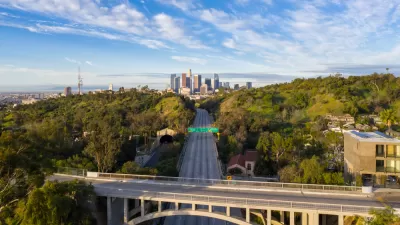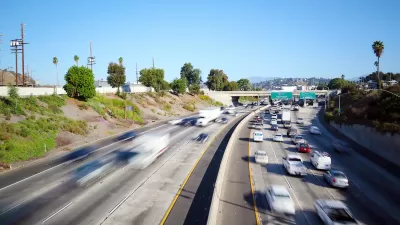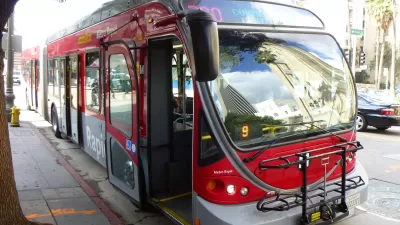The updated language clarifies that projects can include Complete Streets features, items supported by the county's voters through Measure M.

The L.A. County Metro board of supervisors voted on June 24 to approve updates to the county's Highway Program that will allow "for flexibility on future highway-funded projects, many of which are on city streets." Joe Linton reports on the story for Streetsblog Los Angeles, writing, "[t]he Metro Highway Program had blocked complete streets features from being included in projects funded by some Metro sales tax revenue. Now, where appropriate, these projects can include features that support transit, bicycling, and walking."
Despite a voter-approved sales tax measure that "defined 'Highway Construction' as projects on 'public highway and street rights-of-way… includ[ing] Complete Streets, Green Streets, and active transportation improvements such as bikeways and pedestrian improvements,'" the Metro Highway Program's guidelines "did not acknowledge this voter-approved, multimodal direction."
Linton writes that "[t]he short-term effects of the new policy will not be dramatic, but two Long Beach projects that were essentially put on hold by the Gateway Cities Council of Governments can now move forward with Metro funding. Hopefully, in the longer term, Highway Program projects will include more multimodal components, providing the broad range of transportation options that voters approved in Measure M."
FULL STORY: Metro Board Approves Highway Program Modernization

Alabama: Trump Terminates Settlements for Black Communities Harmed By Raw Sewage
Trump deemed the landmark civil rights agreement “illegal DEI and environmental justice policy.”

Planetizen Federal Action Tracker
A weekly monitor of how Trump’s orders and actions are impacting planners and planning in America.

The 120 Year Old Tiny Home Villages That Sheltered San Francisco’s Earthquake Refugees
More than a century ago, San Francisco mobilized to house thousands of residents displaced by the 1906 earthquake. Could their strategy offer a model for the present?

In Both Crashes and Crime, Public Transportation is Far Safer than Driving
Contrary to popular assumptions, public transportation has far lower crash and crime rates than automobile travel. For safer communities, improve and encourage transit travel.

Report: Zoning Reforms Should Complement Nashville’s Ambitious Transit Plan
Without reform, restrictive zoning codes will limit the impact of the city’s planned transit expansion and could exclude some of the residents who depend on transit the most.

Judge Orders Release of Frozen IRA, IIJA Funding
The decision is a victory for environmental groups who charged that freezing funds for critical infrastructure and disaster response programs caused “real and irreparable harm” to communities.
Urban Design for Planners 1: Software Tools
This six-course series explores essential urban design concepts using open source software and equips planners with the tools they need to participate fully in the urban design process.
Planning for Universal Design
Learn the tools for implementing Universal Design in planning regulations.
Clanton & Associates, Inc.
Jessamine County Fiscal Court
Institute for Housing and Urban Development Studies (IHS)
City of Grandview
Harvard GSD Executive Education
Toledo-Lucas County Plan Commissions
Salt Lake City
NYU Wagner Graduate School of Public Service





























